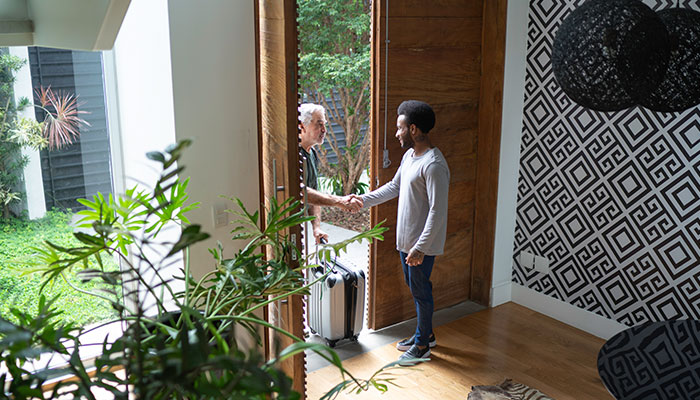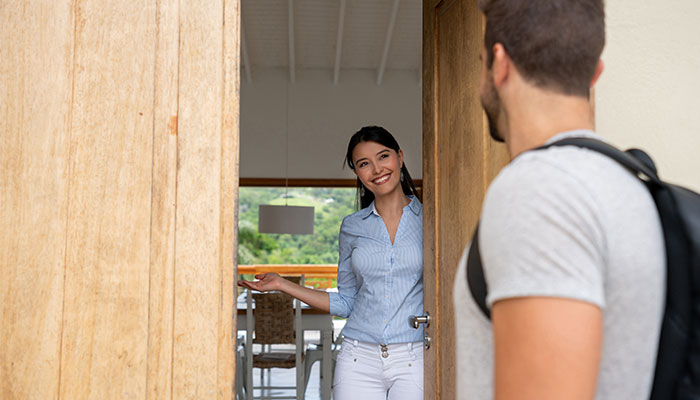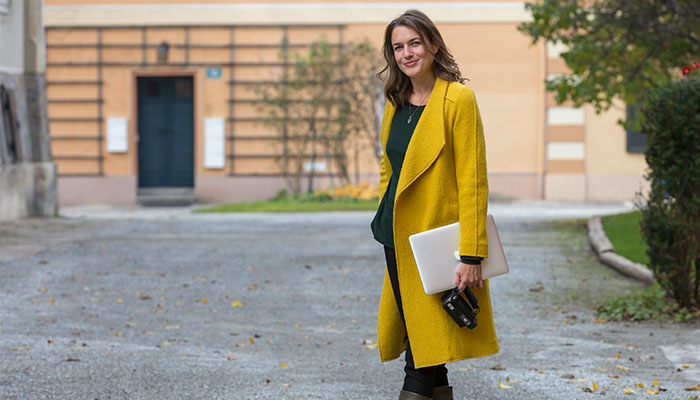When guests and hosts spend time together in Airbnb accommodation, they don’t relax and act like they are ‘at home’, instead changing their behaviour with the platform’s rating and review system in mind.

Double edged: Air b & Bs ratings and reviews systems influence how people engage with each other, says Roelofsen.
Airbnb is part of the “reputation economy” where both host and guest are reviewed and rated after their stay.
“This plays a major part in controlling hosts and guests’ behaviour - most of the time,” says Macquarie University geography lecturer, Dr Maartje Roelofsen, who has used ethnographic techniques to chronicle her own and her hosts’ behaviours over a number of years.
Airbnb’s rating and review system and other data-recording applications used by the platform become social regulators that influence how people engage with each other and how they ‘make home,’ she says.
Her investigations look at how Airbnb has impacted both the guests’ and the hosts’ experience and their understanding of “home” when they spend time together in temporarily shared space.
Aside from studying the platform’s impact on the housing market and everyday life in neighbourhoods, Roelofsen says there was a need to understand Airbnb’s effect on a household scale.
In the last few years, Roelofsen has stayed with 11 Airbnb hosts in Europe for up to five nights each. Relying on a combination of ethnographic and autoethnographic methods, she chronicled her own behaviour and that of her hosts.
Autoethnography challenges the idea of being detached from what is researched and requires the researcher to reflect on their own role and experience in the process.
The concept of ‘home’ becomes a contested place between guest and host.
This was particularly important in the Airbnb experience in which the subjective understanding of ‘home’ is dependent on the continuously changing relations and interactions between hosts and guests. She interviewed her hosts during various stages of the stay and participated in their everyday activities whenever she could or was asked to.
“I found that with Airbnb the concept of ‘home’ actually can become a contested place between the guest and the host,” she says.
“Sometimes out of politeness our roles were reversed and it isn’t clear who is the host or who is the guest. They tried not to inconvenience me and I them. It caused us both unease and uncertainty. The home became a commodity not a place of authenticity or localness, as Airbnb would claim in its marketing campaigns.”
Stage managing hospitality
What Roelofsen discovered was that many of her hosts changed their own behaviour to adapt to her stay. “To give more space to me one of my hosts went so far as to literally make himself invisible, staying away from the common spaces of his apartment and providing visitors like me with a sense of being in a ‘private’ home of their own,” she says.

Duality: Airbnb challenges the social roles of hosts and guests according to Roelofsen.
At the same time, Roelofsen tried very hard not to inconvenience her hosts either. “I would make sure not to come home after 11 pm; not to use the shower in the morning before they did; or, wake up and move around the living room and kitchen not too early or too late,” she says.
Intuitively she “stage-managed” herself to be a disciplined and clean guest as a reciprocal act of hospitality to the host. She double-checked the bathroom to make sure it was clean after using it, tidied her room and controlled her interactions with the host.
“In the Airbnb experience the duality between the social roles of host and guest is often implicitly challenged,” says Roelofsen.
“Home is often represented as a place where people relax, are emotionally unrestrained and enjoy a sense of freedom. A place where they could be grumpy, loud, late, early, messy and above all dirty. This didn’t happen during my stays,” she says.
Much of this behaviour was out of politeness, Roelofsen adds, but also because as part of the “reputation economy,” both host and guest are conscious of potential reviews.
* The rise of eco-anxiety
* Is it good to be a perfectionist?
Airbnb is one of the iconic cornerstones of the new “sharing economy”, offering temporary guest accommodation in seven million properties, in over 100,000 cities globally. But while it has boosted income for millions of people letting out their properties or rooms within it, it’s not existed without controversy, most notably for its impact on housing markets.
Airbnb may not really provide that ‘authentic’ experience they may be seeking.
In its marketing, Airbnb attempts to provide guests an experience that is a “home away from home”, Roelefsen says. “In reality, it is actually constrained by the guest and the host’s experience of ‘home’ and does not really provide that ‘authentic’ experience they may be seeking.”
Dr Roelofsen’s research also looks at various applications and technologies used by Airbnb to monitor, record and measure the behaviour of hosts and guests.
Her recent article in Tourism Geographies relates Airbnb’s ‘ranking logic’ with China’s social credit system by adhering to the rules and the suggestions provided by the platform in order to be highly ranked in its global ‘community-of-tomorrow’.
The research could be used to inform Airbnb’s future guidelines for hosts and give them insights around what can happen when they commodify their home.
Dr Maartje Roelofsen , pictured, is an Associate Lecturer in the Department of Geography and Planning in the Macquarie University Faculty of Arts.




